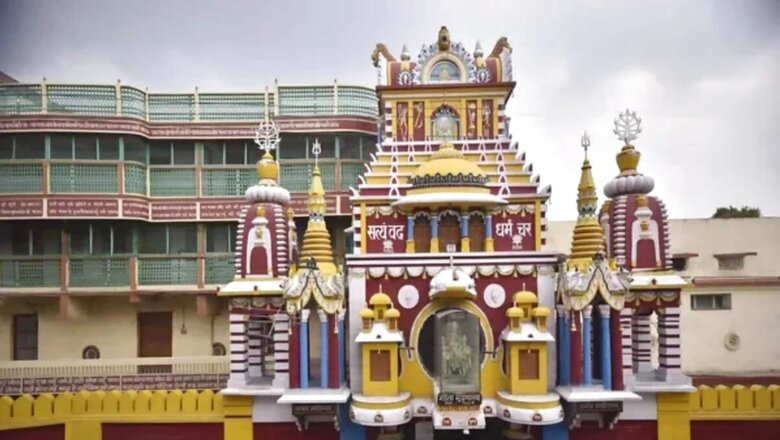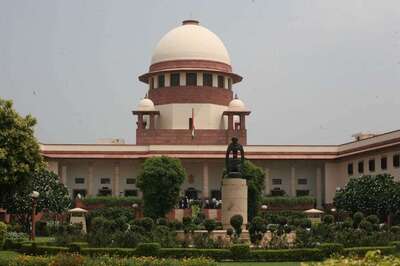
views
When a senior political party leader quotes a book to tell the story of his own organisation, it in a way conveys how distant the party has become from its own roots.
On Monday, 19 June 2023, senior Congress leader Jairam Ramesh criticised the Modi government for awarding the Gandhi Peace Prize for 2021 to Gita Press. Calling the decision, taken by a jury headed by Prime Minister Narendra Modi, a “travesty”, he posted a scathing tweet: “There is a very fine biography from 2015 of this organisation (Gita Press) by Akshaya Mukul in which he unearths the stormy relations it had with the Mahatma and the running battles it carried on with him on his political, religious & social agenda. The decision is really a travesty and is like awarding Savarkar and Godse.”
Since Ramesh has taken refuge in a book to target Gita Press, let’s read what else Akshaya Mukul’s Gita Press and the Making of Hindu India (HarperCollins) has to say about the Gorakhpur-based publisher and its ties with Gandhi and the national movement. Quoting Mukul also makes sense because he is an esteemed member of the Left-‘liberal’ intellectual/journalistic ecosystem — someone on whom Ramesh and his party repose complete trust.
In the third chapter of the book, ‘Contributors: Local, National, Transnational’, which largely talks about Gita Press’ relations with Gandhi and other freedom fighters, among others, Mukul writes: “In 1926, when (Hanuman Prasad) Poddar went with Jamnalal Bajaj to Gandhi to seek his blessings for Kalyan, he was given two pieces of advice by the Mahatma: Do not accept advertisements and never carry book reviews.” Gandhi’s argument was simple: “Advertisements often made tall claims that were untrue and once they started coming they would generate a lot of revenue so it would be impossible to stop them. As for book reviews, Gandhi held that most writers would expect laudatory remarks and one would have no choice but to praise every book or else risk offending the writer.”
To the uninitiated, it needs to be told that Hanuman Prasad Poddar was the founding editor of Kalyan, a monthly religious journal in Hindi published by Gita Press, from 1926 till his death in 1971. As for Kalyan-Kalpataru, it’s an English language monthly on the lines of Kalyan that has been published since 1934.
Gandhi’s advice didn’t go unheeded and even today Kalyan and Kalyan-Kalpataru do not carry advertisements or book reviews. It’s interesting to see Gita Press, which still follows the core Gandhian philosophy, being targeted by the Congress, which shunned Gandhi’s advice of disbanding itself post-Independence. One also needs to ponder if the newspapers/magazines run by the Congress/Congressmen follow the Gandhian philosophy of shunning advertisements.
Now, let’s look at Poddar’s “differences” with Gandhi. Here again, Ramesh’s ‘favourite’ author, Mukul, writes, “Though early issues of Kalyan carried several pieces by Gandhi, who also blessed the journal with a handwritten note carried in Bhakta Ank, the annual issue of Kalyan in 1928, Poddar was not willing to publish Gandhi’s translation of the Gita — Anashakti Yoga — as he felt that Gandhi’s refusal to accept the Gita as a historical text was not in consonance with the views of Gita Press.”
It needs to be emphasised here that Saraswati, a legendary Hindi magazine founded by Chintamani Ghose and taken to great heights by Mahavir Prasad Dwivedi, whose 17-year stint as editor is called the ‘Dwivedi Yuv’ (Dwivedi Era) of Hindi literature, too carried articles that were critical of Gandhi basing his entire philosophy of life on the Bhagavad Gita and yet refusing to accept its historicity and also calling the Mahabharata an “imaginary tale”.
Ramesh and his “Janeudhari”, poll-season temple-hopping leader must answer if they too, like Gandhi, don’t believe in the historicity of the Mahabharata war and the Bhagavad Gita. And if they disagree with the Mahatma (for electoral reasons, of course), how do Poddar’s differences with Gandhi become big enough to disqualify Gita Press for the Gandhi Peace Prize?
Of course, Poddar was critical of Gandhi’s mishandling of Khilafat and Partition. The Mahatma’s failure at handling the two incidents has been largely conceded by historians. The fact is that, even at Noakhali in 1947, Gandhi failed to prevent the attacks on Hindus and in the end, if an 8 April 1947 report of The New York Times is to believed, all the Mahatma could tell the Hindus of Noakhali was “leave or perish”, as he left for Bihar where riots were taking place in retaliation against the massacre of Hindus in Bengal. Gandhi, again using his moral strength over Hindus in Bihar, coerced them to shun retaliatory violence. Nehru, who was conspicuous by silence over Noakhali, went a step forward and threatened to bomb Hindus if they attacked Muslims in Bihar. Despite his differences, as Mukul writes, Poddar continued to praise “Gandhi’s principles of ahimsa and tolerance”.
Whatever Jairam Ramesh and Rahul Gandhi’s Congress may say, the fact is that Gita Press was far from being untouchable in the pre-Independence era. From Sri Aurobindo and the Mother, who together contributed more than 50 articles to Kalyan, to ISKCON founder Swami Prabhupada, who held Gita Press “in high esteem for popularising the Gita and the cult of Krishna”, the Gorakhpur-based institution wasn’t fringe by any stretch of imagination. Even among the Congress bigwigs, it drew considerable support, with the likes of C Rajagopalachari, Pattabhi Sitaramayya, Lal Bahadur Shastri, Dr Rajendra Prasad, GB pant, and KM Munshi liberally contributing for Kalyan. Poddar could even get the likes of Rabindranath Tagore and S Radhakrishnan to write for him.
“There were scholars and philosophers who did not see the crisis in Hinduism through the highly debatable and translucent prism of Gita Press, but still wrote in Kalyan. Writers like Rabindranath tagore, Kshitimohan Sen, CF Andrews, S Radhakrishnan, as can be discerned from their response to Poddar, genuinely considered Gita Press and Kalyan as a spiritual and religious intervention without subscribing to its communal agenda,” concedes Mukul, despite his deeply-ingrained ‘secular’ suspect for Hindutva politics.
There was, however, one Congress leader who refused to have any truck with Gita Press. Poddar and Nehru had met briefly when the latter visited Gorakhpur during the 1936 floods. Poddar, if reports are to be believed, had also offered Nehru his car. Still, Nehru refused to even send a short message despite requests from Poddar for the Hindu Sanskriti Ank and the Manavta Ank. It was, therefore, Nehru’s Congress that had utter distrust and distaste for Gita Press, not Gandhi’s Congress. Since Rahul’s Congress is the successor of the Nehruvian system, not Gandhian philosophy, this explains its objection to Gita Press — “a leading purveyor of print Hinduism in the 20th century”, according to scholar Paul Arney — being feted with the Gandhi Peace Prize for 2021.
In the end, what makes Gita Press an ideal institution to get the Gandhi Peace Prize is its inherently Gandhian character. Since its foundation in 1923, the Gorakhpur-based publisher has followed the core ideal of the Bhagavad Gita: Of putting society over self, of letting karma do the talking. No wonder, at the mega library of Gita Press, which has so far published 16.21 crore copies of the Bhagavad Gita (besides 11.42 crore copies of Gita in other Indian languages) and 11.73 crore copies of the Ramcharitmanas, Akshaya Mukul could find “everything but the story of the press, or information about Poddar and (Jaydayal) Goyandka (the ideological fountainhead of Gita Press)”.
Gita Press is more Gandhian than Rahul Gandhi’s Congress. The party’s opposition, therefore, betrays Nehruvian distrust for Hinduism. Gandhi is just an excuse.
The author is Opinion Editor, Firstpost and News18. He tweets from @Utpal_Kumar1. Views expressed are personal




















Comments
0 comment